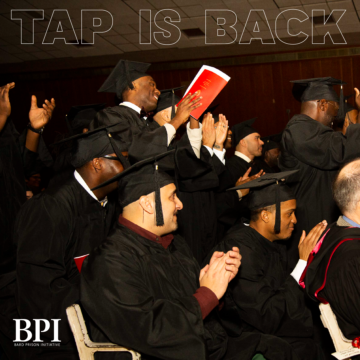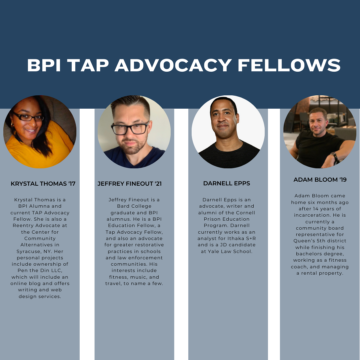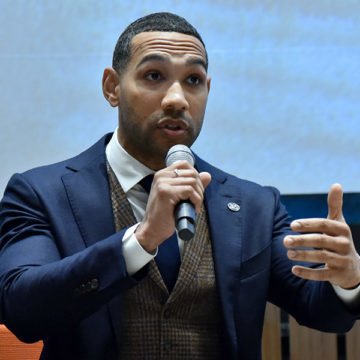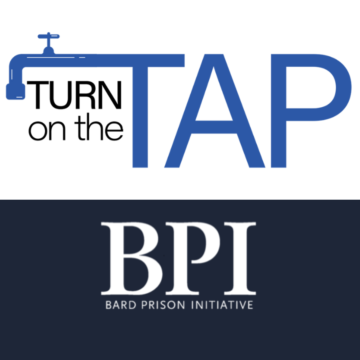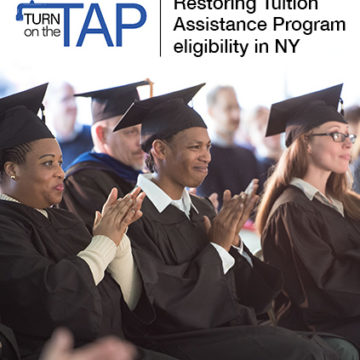Last week, the New York State budget included a major victory for educational equity, ending a 26-year-old ban on access to need-based Tuition Assistance Program (TAP) grants for incarcerated students. Having myself attended college while incarcerated, I can attest to the importance of the opportunity to transform one’s life through education. This win will profoundly impact the lives and trajectories of countless individuals, their families and their communities.
Growing up, I was a straight-A student. I was never too impressed with myself; I’ve simply always loved learning. I imagined the future me in countless different professions. Despite my aspirations and potential, I dropped out of high school the year my parents divorced. Being smart became a worthless boast among the company I kept, and for a while, I was reckless with no real sense of direction.
Still, I saw going off to college as a chance to escape my then reality. I tried to finish high school multiple times before earning a GED. When I relocated to New York to attend college, I learned that there’s more to a fresh start than a change of setting. While I did earn an associate degree, I still faced personal struggles and had my first child during that time, so I never continued on to earn a bachelor’s degree as I had intended. That would be my last experience with higher education until years later with the Bard Prison Initiative (BPI), after I became incarcerated.
My experience with college-in-prison was drastically different from anything before it. Initially, I struggled to see the practical benefit of what I was learning. But the curriculum improved my comprehension and taught me how to better communicate and reason. I took liberal arts courses that exposed me to larger social issues, challenged my perspectives and informed my perception of the world. And the benefits transcended beyond the classroom. More than the degree, I cherish the growth.
Even now as I work in reentry advocating for other justice-involved people, I endeavor to be a voice for those who are behind bars. The glaring connection between the limited educational opportunities available for incarcerated people and the obstacles that formerly incarcerated people encounter is undeniable. That is why restoring TAP eligibility for incarcerated students is such a major victory. With the return of public funding to college-in-prisons, experiences like mine can become the norm and not the exception.
In the years since TAP was banned in 1995, small college-in-prison programs like BPI have developed using mostly private funding. However, these funding streams are never guaranteed. This creates vast uncertainty and makes it hard for programs to reach more students. It also makes it difficult for more colleges to offer degrees in prison.
Reentering society after incarceration is a daunting enough process. People typically combat food insecurity, homelessness, financial indigence, technological gaps, reunification hurdles and employment barriers all while facing supervision constraints. Any aspiration for learning a trade or obtaining higher education once released — either of which might improve their chances of reintegrating successfully — will take a backseat to more immediate concerns.
While a college degree doesn’t make these challenges disappear, it goes a long way toward helping overcome them. Expanded access to college-in-prison will give incarcerated students an opportunity to make use of their sentenced time by preparing for a true second chance. BPI’s recidivism rate is 10 times lower than the New York average. Students, educators, advocates and correctional professionals have long understood the effectiveness and benefits of offering liberal arts education for incarcerated people: individual growth, reduced recidivism rates and reduced state spending on incarceration. Many college programs also help students with reentry, employment and career development, housing, systems navigation and continuing education. Educated formerly incarcerated people return to their communities with the tools they need to successfully reintegrate and can even contribute to their communities in larger ways.
Annually, about 50,000 people are incarcerated in New York, with 35% of these people who are reincarcerated. Such a high rate of recidivism is also not conducive to the well-being of New York’s families and communities. So many residents have experienced the incarceration of a loved one. Studies show that elevated incarceration rates within a community correlate to high poverty rates. Considering that 95% of incarcerated people will return home, it matters greatly how the state helps prepare them to reenter society. College-in-prison is the ideal solution.
As early as 2014, the majority of voters in New York have supported a return to public funding of college-in-prison. A recent Siena Research poll showed public support has not wavered. This is a rare area of bipartisan agreement because it is common sense good public policy. We, the people, have long been ready: Fathers, mothers, sons, daughters, friends, neighbors, residents of New York State. This victory for the Turn on the TAP campaign will reverberate beyond college-in-prison programs to improve the very fabric of our communities.



